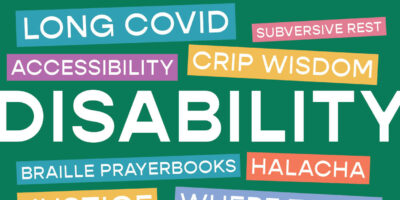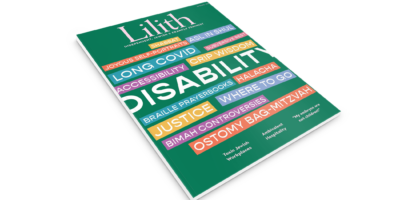
Self-Portraits by Dana Kearley, www.danakearley.com, insta: @danakearley
The Rest of My Life: Long Covid’s Poignant Reminders
It was February of 2020 when I got sick. Maybe something was resurfacing, or maybe I was dying. That’s what my body felt—closer to death than it had ever been. Heavy and hot, the indent of my limbs permanent on the dingy sheets.
Our bedroom was up a flight of stairs. We’d moved in a year ago when my wife got into a graduate program. She hadn’t told me she was applying to graduate school, but once she got in I was expected to move.
I took a job as a special education teacher at an under-resourced, over-enrolled public school in a nearby city. Each afternoon I stayed late and was too exhausted to do anything at all by the time I got home. But my partner needed me, financially and emotionally, and rest would have to wait.
I made myself small and stable and soft. A sturdy pillow, a vessel of comfort, an object you could scream into. I tried to abandon my desires and ambitions for the sake of my wife, but knew something would have to change.
In February of 2020 the seam holding my softness together gave way, and the pillow I had transformed into could no longer bear another’s weight. Stuffing and feathers escaped the fabric’s confines and I spilled out onto the bed.
I was sick. I called out of work, guilt-ridden but relieved, and slept for days on end, rising only to hobble down the stairs for water or the bathroom. I couldn’t smell, I couldn’t taste, I couldn’t read or write or sit up. My throat ached as though I had swallowed marbles and was unable to keep them down, a constant throbbing, pulsating, round and heavy pressure. I was cold but covered in sweat, my limbs water-logged and stiff, my vision blurred. When I stood and forced myself to move, my heart raced and blood rushed, nausea and darkness coloring the space left behind.
Two weeks later, schools shut down. Covid was officially in the region. I called local hospitals to see if I could get tested, though I felt certain I didn’t have it, since my symptoms weren’t what they had identified as indicative of an infection.
“Do you have a cough?” the testing coordinator asked over the phone.
“No but I—”
“We only test if you have a cough.”
My wife and I stayed home every day, made cloth masks and waited to hear from our employers. My school was unable to offer virtual learning because our students didn’t have computers. Maybe it was pandemic-induced anxiety, maybe my wife felt me pulling away, maybe she just didn’t believe me—whatever the cause, her caretaking reached a limit and when she asked me to start “pitching in again,” it didn’t feel like a request.
Though mine was a same-sex marriage, the dynamic of responsibility followed heteronormative trends. I, the more traditionally feminine partner, took on the majority of household duties, care work, and cooking.
When I fell sick, there was not enough caretaking to go around. What I know now, four years later, is that rest, the ability to fully give into the demands of one’s body, is vital to recovery.
It is no wonder that women are more likely than men to experience Long Covid—the economy of care that befalls us on
any given day remains intact even through illness. If women are expected to be the primary caretakers, and neither womanhood nor caretaking is valued, what happens when our bodies can no longer bear the burden of care? What happens when we need another to care for us?
It took three months until I made a recovery—and for two years I lived the active life I’d grown accustomed to pre-pandemic. I wore masks but I exercised while testing regularly, limiting my social circles, and using an air purifier—these were easily organized interventions. But in March of 2023 a cold proved more than I could manage. I have had Long Covid ever since, and very well may for the rest of my life.
In our culture that conflates value and ability, it is easy to find yourself somewhere along the post-viral spectrum. It is easy to push, or be pushed, or (more likely) some combination of the two, into ignoring your body, assigning some valence of alternate logic to your racing heart, low cortisol, persistent fatigue, or evergreen throat pain.
“I just need to find more balance,” you tell yourself while driving to a full time job, putting your makeup on at red lights, the week’s readings playing through your bluetooth on 1.5x speed. “I just need to figure out which supplements to take,”
you quip to the acupuncturist, your PCP, dietician, therapist, checkout person at Perelandra Natural Foods. “I just need to rest,” you say only to yourself, hoping that someone might write you a permission slip.
When I met with Adina, a fellow long-hauler, community organizer, and former moderator for a popular online Long Covid support group, she helped me see that Judaism could offer a counternarrative: “One of the gifts I have from Judaism is that you just have value because you’re created in the image of God. Your value is not tied up in your ability to be productive.” Adina, who has had Long Covid for approximately four years, didn’t have the return-to-baseline that I did; she has persistently experienced a variety of symptoms since her initial Covid infection, and her symptoms flared when she was infected again.
Experiencing a new disability is usually portrayed as a tragedy, and while there are awful aspects to finding yourself suddenly disabled by Long Covid—for example, a lack of community care demonstrated in relaxed or non-existent masking, the preventable nature of so many infections and deaths, the ongoing denial in many spaces that fail to implement proper safety measures—ableism, not being disabled, is the tragedy.
A disability itself can be a gift, an opportunity to learn new ways of understanding the world, a shift in perspective, a grounding in a new reality. “Disabled and Deaf gain—the brilliance within our bodyminds—help us take root amongst the stars,” writes Leah Lakshmi Piepzna-Samarasinha in her brilliant treatise, The Future is Disabled. Disability can gain us access to knowledge, ways of perceiving time, communities of care and wisdom and intimacy. Perhaps one of these gains is clarity: each of us has inherent value.
So much writing about Long Covid ends with notes of hope, “not yet,” “one day,” “when there is a treatment,” “when they find a cure.” On some level it’s easier to look to the future and imagine yourself able in the same ways you’ve always been. In this fantasy we will someday shake off this yoke of dependency, the ties that keep us tethered to our beds, our wheelchairs, our homes, the needs of our bodies. But do we really want to proselytize for rugged independence, and devalue care? Piepzna-Samarasinha asks, “why is it so bad to be linked to something gorgeous—a wheelchair, a home, a bed—that helps you fly?”
In recent months I have found myself in need of help getting groceries, cleaning, taking care of my dog, cooking, and completing other daily tasks. A dear friend stepped in and offered to relieve me, and created a schedule with loved ones—some I have known for years, others I am deepening connections with for the first time—to make sure I’m cared for.
For Adina, a similar process has transpired with her sister serving as a main source of care, comfort, and social connection. Imagine how deep our connections with one another would become if we took more seriously the wisdom of disabled people, if we wore masks everywhere, used the latest technology to clean our air (see @clean.air.club), and invested in virtual methods of
community building. Instead we are on a slippery slope leaving innumerable folks newly or differently disabled and without systems of support, reinfection protection, and care.
We need better research and treatment for Long Covid not because it is tragic to be disabled, but because we should value life. The more we (collectively) allow Covid to spread, the more people’s immune systems will weaken, and any infection will run the risk of becoming fatal. I asked Adina what she wished people knew about Long Covid. Her response? “It can happen to them.” Long Covid can happen to anyone—young, old, thin, fat, disabled, able-bodied, the cautious and the reckless. It can happen right away or years later, after one infection or many. This is what ME/CFS (myalgic encephalomyelitis/chronic fatigue syndrome) advocates tried to warn the world about in the early stages of the pandemic: post-viral symptoms will impact the world en masse.
As a feminist, resisting false dichotomies has long been central to my praxis, and Long Covid is no exception.
I believe it’s possible to want to warn others while also holding tightly to the dignity of the disabled. Covid precautions should be prioritized, and there is power, joy, and possibility in a disabled majority; it is okay to feel grief over a loss of autonomy, and interdependence is vital to survival. I am angry that for the rest of my life I might not be able to go out dancing while I am grateful to have a comfortable bed, a deep bath, and communal support in my efforts to achieve the best rest I can each day of my life.
Rest, I now see, is not a break from life but the essence of it and my newfound respect for rest has renewed my respect and love for myself and for others.
Mariah Guevin is an educator, artist and writer living in Brooklyn.



